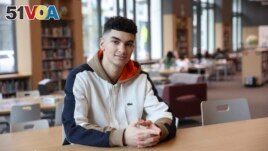06 April 2024
Students like Jeannie Tarnue of Annandale, Virginia, have a chance to say a lot about themselves on their college applications.
They can tell about classroom success that came from long hours of doing homework. They can write about time they spent after school as leaders of student activity groups.
But a decision last year by the U.S. Supreme Court means they will have only one chance to talk about their family background or nationalities. That chance comes in the part of the application that calls for a piece of writing about a single subject, known as an essay.

Max Decker, a senior at Lincoln High School, sits for a portrait in the school library where he often worked on writing his college essays, in Portland, Ore., Wednesday, March 20, 2024. (AP Photo/Amanda Loman)
In the past, students like Tarnue would have been able to tell colleges about their backgrounds in another part of the application. Then they could discuss something else in their essay. Now colleges cannot ask about race.
Tarnue is a first-generation American. She was born in the United States, but her parents came to the U.S. from the African nation of Liberia about 20 years ago.
Tarnue will start college later this year. She started working on her applications around this time in 2023. She thought carefully about the questions that came as part of the Common Application. The application is a standard form that students can use to apply to over 1,000 colleges and universities.
The application offers seven essay prompts, or suggestions. One question asks students to tell a "meaningful story" about themselves. Another asks for a story about "overcoming obstacles." An obstacle is another word for a barrier.
Tarnue said she could have written about what it was like to be the child of immigrants for her essay.
Instead, she wrote about overcoming a challenge. She said she had a speech delay as a girl and found herself in a special education program called IEP. "I was placed at the age of three," Tarnue said. "I talked about my process of leaving that program, because that program is really hard to get out of."
"I also, like, added like, the metaphor of me being a butterfly and coming out of the cocoon."
Tarnue said she used a short-answer part of the application to discuss her family's background in Liberia. She wrote about learning a special Liberian handshake that is connected to the time when those who formed Liberia were enslaved in the United States.
She said she chose not to write about her race in the personal statement because "everyone writes about it, and you have to stand out (above) the other applicants."
A number of students around the U.S. seem to have the same idea. The Associated Press spoke with students in Chicago, Illinois; Cleveland, Ohio; Portland, Oregon, and Boston, Massachusetts about how they decided to write their college essays.
In Chicago, Hillary Amofa said she started "trauma-dumping" when she wrote a first version of her essay. She wrote about being the daughter of immigrants from Ghana. But she worried that the essay did not talk about who she was as a person.
She wondered if she had to "go through something horrible to feel worthy of going to a school?"
Later, she wrote about being at ease wearing her hair in a natural style although her white classmates criticized her about it when she was a girl. Now, she said, she has a small business styling hair for Black women. In her essay, she wrote: "Criticism will persist, but it loses ... power when you know there's a crown on your head!"
After the Supreme Court's decision, some universities expanded their prompts. Brown University in Rhode Island and Rice University in Houston, Texas, included questions that ask about a student's challenges growing up or how their opinions were shaped by their backgrounds or race.
Darrian Merritt of Cleveland wondered if schools like Yale, Stanford or Vanderbilt wanted a "sob story." He said he "wrestled" with the question of whether he went through hard enough times as a child to "deserve having a spot at the university."
Merritt chose to write about an experience at summer camp when he started to feel more at ease, or comfortable. He wrote about wondering whether he was "black enough" and discussed being made fun of for listening to "white people music." He also wrote about "taking ownership of myself and my future by sharing my true personality." Merritt said he felt comfortable sending "an honest story" to colleges.
In Portland, Max Decker started working on his college essays before the Supreme Court's decision last year. At first, he had written about his love of video games. But the essay he sent to colleges was very different. He wrote about a nonprofit community group called Word is Bond. The group works with young Black men. Decker is of mixed race. He said he always felt like the odd one out before he became a part of the group and found acceptance.
On a trip to Washington, D.C. to meet with lawmakers, he realized he offered something special to the world because he is different. Decker said he felt comfortable writing about his race in an essay if it could help him get into a better college. He noticed that his high school friends who had college-graduate parents were in a better position. They knew it was important to get into higher-level classes at the start of high school, for example.
In the end, Decker said both essays were true. But the one he submitted to colleges felt more like the truth the world was expecting of him.
Imani Laird of Boston said she felt as if she had to fully explain the way her race affected her life. "I didn't have it easier because of my race," she said. "I had stuff I had to overcome." So, she wrote about her grandfather. She said he was not permitted to enter a special program for former soldiers to go to college because he was Black. She said facing racism makes her want to do great things with her life, or to excel.
"My goal in class was not just to participate but to excel. Beyond academics, I wanted to excel while remembering what started this motivation in the first place."
The group of students who are finishing high school this year are the first class to submit applications under the new policy. What advice do they have for future students?
Tarnue said students should still write about "moments that really shaped your character and personality and experiences that led to personal growth."
I'm Dan Friedell. And I'm Caty Weaver.
Dan Friedell adapted this story for Learning English based on a report by the Associated Press and a conversation with Tarnue.
____
Words in This Story
application –n. a written request to be accepted to a school, college, or program
standard –adj. regularized for use by everyone
challenge –n. a task or job that is difficult to do
metaphor –n. an idea or image that represents a larger more important idea
cocoon –n. a sheltered place that is not influenced by reality or difficulty
trauma –n. a bad experience
style –n. a design or way something is done
persist –v. to continue doing something even if it is not supported
sob story –n. a sad story which is not taken too seriously
odd one out –expression something that is different and that does not fit in













